Exactly what it says on the tin. Prompts and requests are open.
Don't wanna be here? Send us removal request.
Text
A character can be sympathetic while still being 100% wrong; this is the entire premise of many unreliable narrators.
8K notes
·
View notes
Text
some of the best writing advice I’ve ever received: always put the punch line at the end of the sentence.
it doesn’t have to be a “punch line” as in the end of a joke. It could be the part that punches you in the gut. The most exciting, juicy, shocking info goes at the end of the sentence. Two different examples that show the difference it makes:
doing it wrong:
She saw her brother’s dead body when she caught the smell of something rotting, thought it was coming from the fridge, and followed it into the kitchen.
doing it right:
Catching the smell of something rotten wafting from the kitchen—probably from the fridge, she thought—she followed the smell into the kitchen, and saw her brother’s dead body.
Periods are where you stop to process the sentence. Put the dead body at the start of the sentence and by the time you reach the end of the sentence, you’ve piled a whole kitchen and a weird fridge smell on top of it, and THEN you have to process the body, and it’s buried so much it barely has an impact. Put the dead body at the end, and it’s like an emotional exclamation point. Everything’s normal and then BAM, her brother’s dead.
This rule doesn’t just apply to sentences: structuring lists or paragraphs like this, by putting the important info at the end, increases their punch too. It’s why in tropes like Arson, Murder, and Jaywalking or Bread, Eggs, Milk, Squick, the odd item out comes at the end of the list.
Subverting this rule can also be used to manipulate reader’s emotional reactions or tell them how shocking they SHOULD find a piece of information in the context of a story. For example, a more conventional sentence that follows this rule:
She opened the pantry door, looking for a jar of grape jelly, but the view of the shelves was blocked by a ghost.
Oh! There’s a ghost! That’s shocking! Probably the character in our sentence doesn’t even care about the jelly anymore because the spirit of a dead person has suddenly appeared inside her pantry, and that’s obviously a much higher priority. But, subvert the rule:
She opened the pantry door, found a ghost blocking her view of the shelves, and couldn’t see past it to where the grape jelly was supposed to be.
Because the ghost is in the middle of the sentence, it’s presented like it’s a mere shelf-blocking pest, and thus less important than the REAL goal of this sentence: the grape jelly. The ghost is diminished, and now you get the impression that the character is probably not too surprised by ghosts in her pantry. Maybe it lives there. Maybe she sees a dozen ghosts a day. In any case, it’s not a big deal. Even though both sentences convey the exact same information, they set up the reader to regard the presence of ghosts very differently in this story.
48K notes
·
View notes
Text
there are some things a character should not be able to tell us about themselves EVEN with a gun to their head. depending on the character that could even expand to include "most" things
25K notes
·
View notes
Text

make sure to delete your nanowrimo accounts
(context: nanowrimo's statement on use of ai and calling the argument against ai "classist and ableist")
(additional context: nanowrimo is being sponsored by a ai company this year)
3K notes
·
View notes
Text
So... I found this and now it keeps coming to mind. You hear about "life-changing writing advice" all the time and usually its really not—but honestly this is it man.
I'm going to try it.

102K notes
·
View notes
Text
I used to hate being made to use mindmaps in school but I've found myself increasingly needing them as I try to detangle my own writing work. It's great to get everything on a page where you can see all of it at once. I use a paid app called Scapple 'cause I already use Scrivener its sister programme, and it has helped a lot, especially with bigger stuff. I don't necesserily use mindmap software for just traditionally formatted mindmaps cause they can get slightly chaotic (they're best for working out a character and their mentality in my experience), so I often just use it to order events!
Here's some stuff for my big project, Breaker (spoilers?). I have one file for big overview stuff, episode-by-episode:
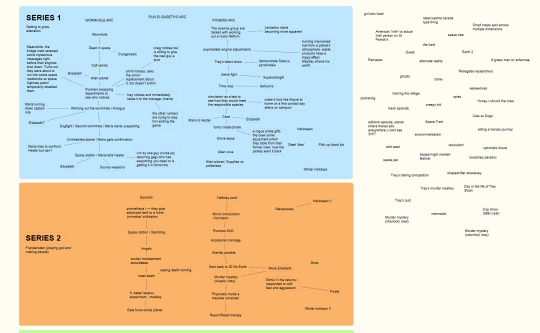
and one for the beat-by-beat within the episodes:
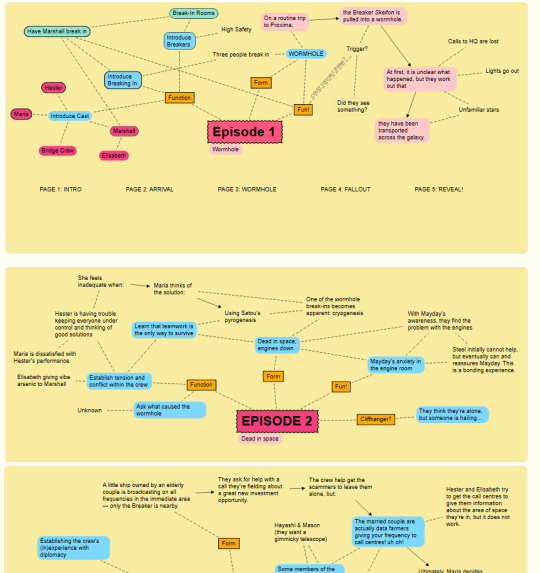
And here's one I used to work out one of the lead characters (on paper):
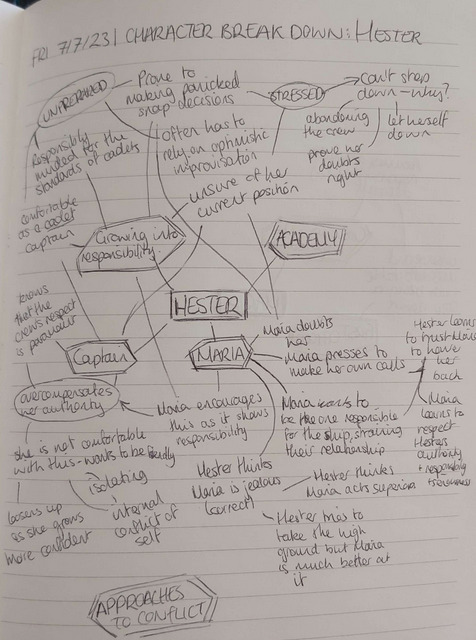
So yeah, timelines, detangling, planning, you can use a mindmap for a lot!
Writers, what happened to making mind maps? I literally haven't seen anyone mention them. Do we just not use them anymore?
12 notes
·
View notes
Text
This is the anti-marketing website, etc. etc. etc., but I've seen a couple of these posts do okay and it's Pride month so... Here goes?
Do ya wanna support a queer disabled author who is still slightly baffled that they broke into tradpub?
Do ya like stories about working class uprisings, set against a backdrop of corporate corruption and Superheroes Behaving Badly?
Do ya yearn for a plucky lesbian underdog of a hero, who becomes a supervillain sidekick while navigating her voracious horniness for both her grumpy butch coworker and her straight best friend (oddly specific, I know)?
Do ya want a murder mystery where we know the victim and the killer, but have to untangle the motive?
Do the descriptions "Laughed my butt off", "Me lesbeeb" and "Books that made me want to burn down the government" make you reach for your wallet?
If so, look no further than my debut, Strictly No Heroics!
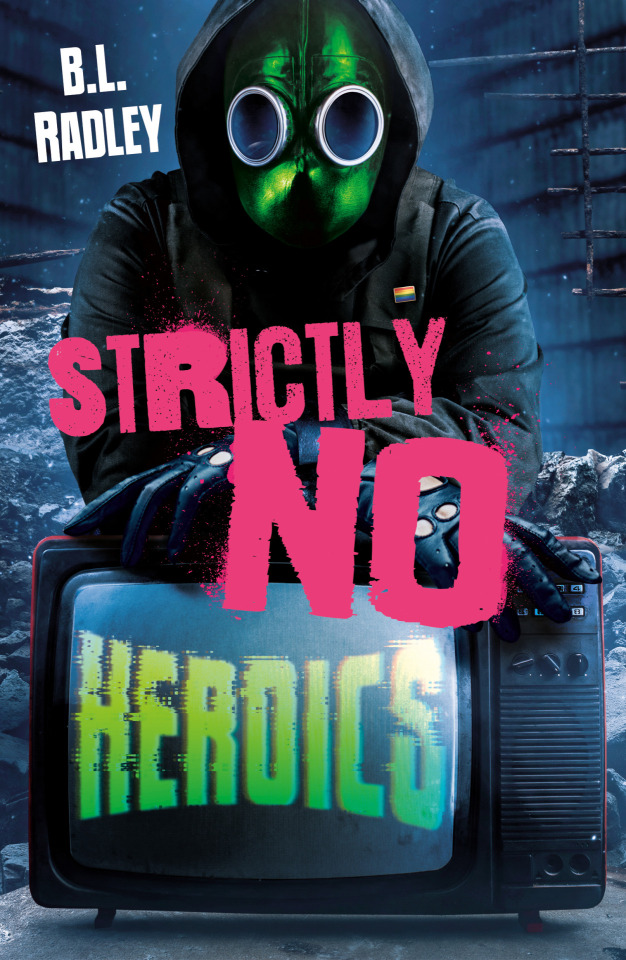
[ID: cover of a book showing a figure in a gasmask, hoodie and gloves, leant on an old TV. A rainbow pride pin is pinned to their jacket. Text reads ‘STRICTLY NO HEROICS’ in neon pink and green, and ‘B. L. Radley’ in white.]
Have an actual blurb too, while you're reading!
If you're a powerless normie in a world run by superheroes, you need three rules to survive:
1: Keep your head down
2: Don’t make enemies
3: STRICTLY NO HEROICS
When a hero gropes her best friend, Riley Jones breaks all of them.
Her attempt at serving justice gets her fired from her summer job. Luckily, Sunnylake City’s biggest business is booming (literally, when there's C4 involved).
Every villain wants henchmen: masked cronies who take their coffee orders, vacuum their secret lairs, and posture in the background while they fight. The HENCH agency provides a steady stream of drop-outs and losers who are willing to get beaten up for minimum wage.
Riley might just be the perfect candidate.
You can
buy my book here
UK version here
Reblogs are greatly appreciated, and kisses to everyone who's already got their hands on a copy!
442 notes
·
View notes
Text
everything u need to know about me can actually be explained by the fact that i read that poem about the serving girl wearing the pearls so they're warm for her mistress when i was like 11 and it rewrote my brain chemistry forever
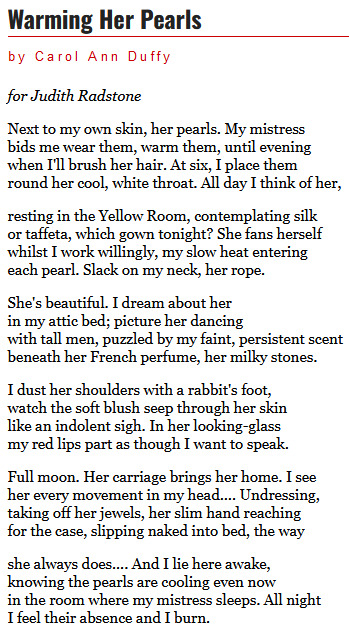
like this Changed Me
61K notes
·
View notes
Text

Mauro C. Martinez (American, 1986) - Shelter (2022)
4K notes
·
View notes
Text
More random tropes that I fucking love: Becoming the mask you wore.
Like oh shit, this character who was sent to spy somewhere under a false identity suddenly realises they've started to genuinely become the person they claimed to be? Someone who's been telling the same lies about who they are for so long that they're actually forgetting that the story isn't true? Finding themselves genuinely doing the things they pretend to do in front of people, when they're alone and nobody's watching? Answering to a name that wasn't supposed to be theirs without thinking?
Ooohh-hoh-hoh, you lost track of yourself in pretending to be someone else? You were only supposed to impersonate somebody, a plausible background and a name you came up with on the spot, and now that the people you were supposed to infiltrate have become your true companions? You lost yourself in the game you played, and no you no longer know who you truly are, and where your true loyalties lie? And both sides would mark you a traitor if you came out with the truth. On a scale of one to ten, how bad did you fuck up.
Fuck that is a good trope. Never seen it done badly. Pour that shit on a table and I'll chop it into lines and snort it.
47K notes
·
View notes
Text
I am a big advocate of revealing big secrets in your story sooner rather than later.
See, if you keep all your secrets until the end, you risk becoming a Rowling, always with your GOTCHA right in the climax. You're just pulling the rug out from under the readers, and not giving them much time to do anything with that information.
But what if you revealed some of your secrets earlier in the story? Not even necessarily to the characters, either - you could have the person who knows about it reveal it to the audience through internal thoughts, but not letting the other characters know until later (and possibly not through them at that!).
The thing about doing it this way is, it gives you the opportunity to do more. The more your audience knows, the more you can do with them. It opens up new possibilities for plot threads or character development, and you don't have to work so hard to keep every little thing hidden. You get to build up your characters out in the open, where your audience can actually see what you're doing, even if they still don't have everything. Heck, it can build up anticipation, too! The readers know the secret, but the characters don't, and the readers want to see them find out.
I used to keep a lot of secrets in my writing. Now that I'm thinking back, a number of those secrets were about certain aspects of various relationships. For some reason, I always thought, wouldn't it be suuuuper neat to have this be a reveal at the climax or something? So I just kept saving it and saving it.
But then people would read a chapter here and there. They would ask questions about those relationships. And I started deciding to put those reveals earlier. I don't know what it was that made me do it like that, but it did. And let me tell you, it was such a weight off my shoulders. It wasn't some big plot reveal in the climax, it was just a part of who the characters are. And with that laid out already, I could build on it to create the real arc.
Now, I'm not saying you should reveal everything. Some things should be kept secret. It's the kappa element of storytelling, as C.S. Lewis called it, though perhaps not as thorough as he meant it. But it's a question of discernment:
Is this a plot point that needs to wait and be unveiled at the more proper time, or is this a vital part of the character that needs to be known to understand who they are?
213 notes
·
View notes
Text
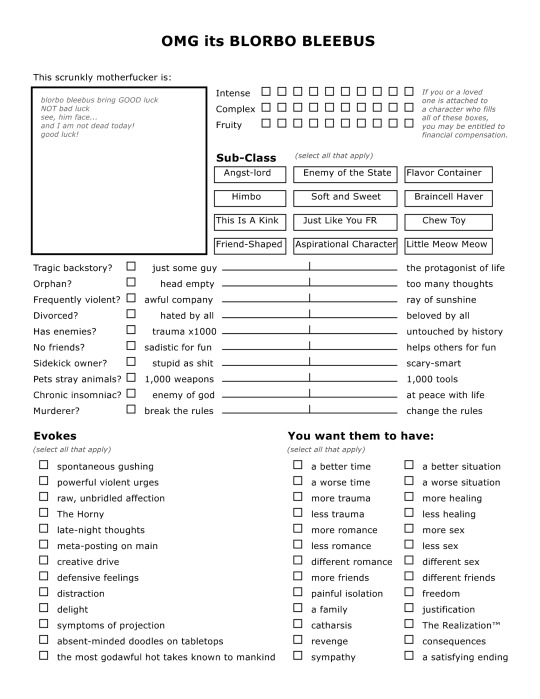
i made a character sheet. free to use as you wish, feel free to change whatever you want XD open source ass thing. spent all of ~maybe an hour on it.
Credit: the text in the insert-image box comes from this video, and the text for the top three lines (intense, complex, fruity) comes from this post. The actual image was made with the free NBOS character sheet creator, which is a sort of dated but free and solid text-layout sheet maker intended for ttrpg style character sheet creation.
64K notes
·
View notes
Text
my very serious writing advice for people who are trying to write more morally complex characters is to stop caring about their morality and focus instead on their individual motivations
it’s hard to articulate exactly what I mean, but the essence of it is basically: when a character does a murder, not only do I not care about whether they’re justified in doing so, it’s straight-up irrelevant. a character’s moral standing from some nebulous universal standard has no bearing on the plot or their interactions with other characters and has no use in the story for me as a writer. what does matter is why the character thought they were justified and then if it comes up to other characters, what they think about it.
you can obviously think about your characters’ morality but it’s not your job as a writer to interpret your stories for your readers and tell them how to judge your characters. your readers can see the evidence for themselves and draw their own conclusions. your job is just to understand why a character is motivated to act in a certain way and have it make sense
focusing on character motivations is a much more versatile framework than trying to give them specific personality traits or moral alignments, and frankly more useful to understand why a character would do a certain thing instead of just what they do. that way when something fucked up happens and your character starts acting differently, there’s an actual logical reason for it that isn’t you forcing characters to do things because it’s what’s required to make the plot go
when you write your characters with the understanding that people are not static and they act differently under different circumstances, complexity in character and morality follows naturally.
909 notes
·
View notes
Text
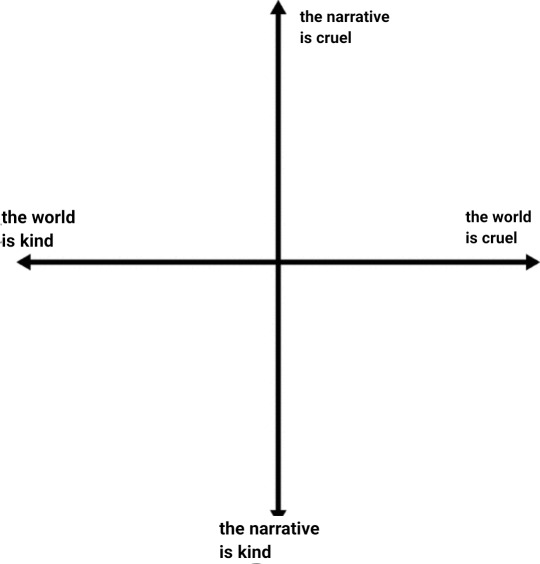
Had an epiphany about worldbuilding today
295 notes
·
View notes
Text
it’s woobifying when you put him in miserable situations that make him cry pathetic tears, when I put him in miserable situations that make him cry pathetic tears it’s finitude unexpectedly discovering its smallness before divinity in a grotesquely real moment of suffering which is at the same time arresting grace
466 notes
·
View notes
